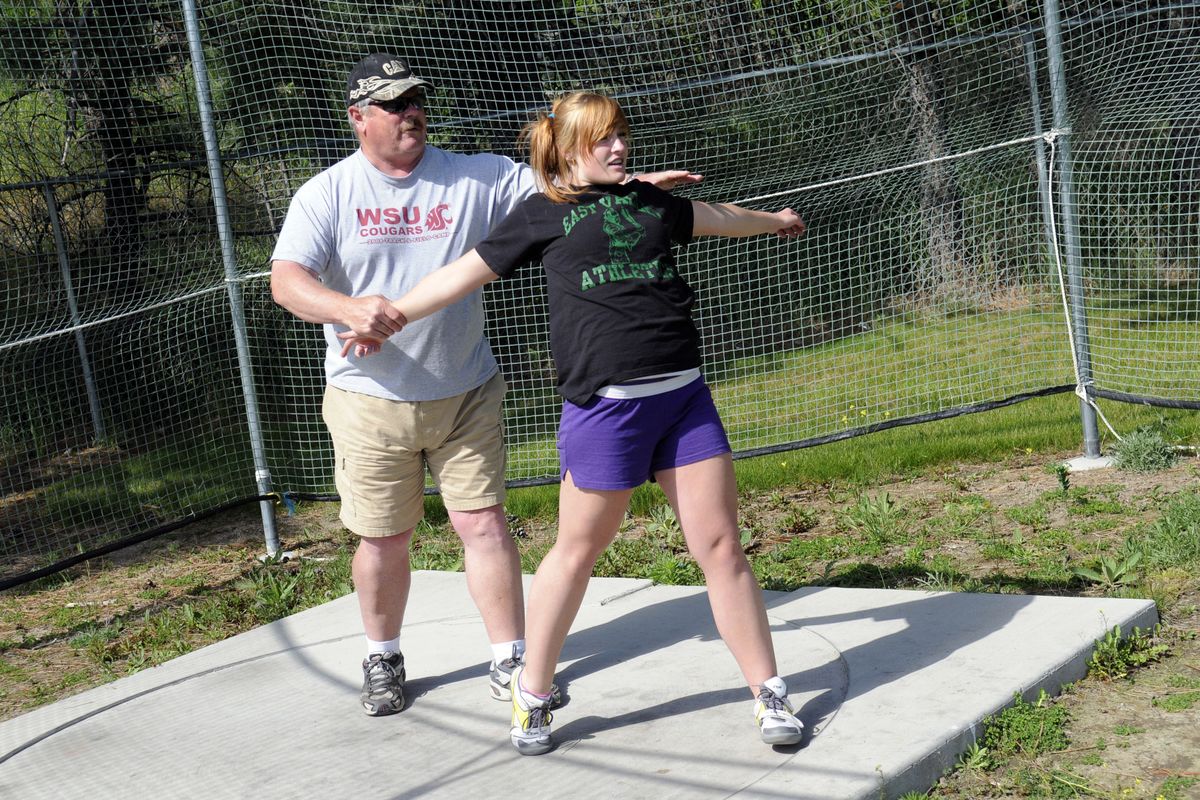Knights throwers head to regionals
EVHS assistant coach Dunning’s methods proves successful year after year

Chuck Dunning doesn’t so much coach throwers as he trains throwing coaches.
The East Valley High School track assistant coach has a long-honed reputation for having quality shot put, discus and javelin throwers. Under Dunning, the Knights are a fixture in the state meet, with at least one finishing on the awards stand most years.
“By the time they’re a senior, our kids probably know as much about their event than most high school track coaches,” Dunning said. “They’re like having assistant coaches there working with one another. In fact, they’re pretty much our de facto junior varsity coaches. We let them work with the freshmen because they all know so much.
“I can guarantee you this: If you asked each one of our kids at the regional meet what they were struggling with and what they had to do to fix it, they could all give you a very detailed answer.”
It’s about tradition, he insists. The school has a long history of producing quality throwers – both boys and girls.
“We’ve developed an ethic for throwing,” he insists.
Between the javelin, coached by first-year assistant coach Jon Thomas, the shot and the discus, both coached by Dunning, the Knights took the top two District 8 3A spots in the discus, swept the top three in the shot put and were first and third in the javelin.
Joey Strehlou heads into this week’s regional track meet as the district champion in the shot put after throwing 48-feet, 1¼ inches at Spokane Falls last week – with teammate Joe Mead just 2½ inches behind. David Braviroff threw 143-10 to win the discus, and Zach Ames threw a season-best 188-0 to win the javelin.
Dunning looks for his athletes to better those marks this week, with the goal of throwing a season-best mark at next week’s state track and field championships.
“We train for the big meets in May,” Dunning said. “We don’t worry about the early season meets. We train hard right through the first part of the season, and then we taper off and, hopefully, peak at the end.”
This time of year, he said, he has to emphasize rest – his throwers are so used to working hard that they want to do too much.
“I have to keep talking to them about the importance of rest,” he said. “The hay’s in the barn, so to speak.”
Proven coaching
After a 35-year coaching career, both in Spokane and in California, Dunning’s approach to throwing the shot put, discus and hammer all have a proven track record.
“The way I train throwers, it’s all systematic,” he said. “They’re all trained the same. We want the kids to understand the cues and to do that you have to have a common vocabulary and they all do common drills.”
While they may all look simple, the throws in track and field can quickly get complicated.
“There’s nothing a kid can do that’s more complicated than discus other than, maybe, pole vault,” Dunning said. “There are literally thousands of things. You can get buried in minutia.”
Dunning overcomes that by putting all of his throwers through the same series of drills, with an emphasis on feel. He’s as apt to ask his athlete how he feels when he or she performs a throw as he is to offer advice.
“I think what separates the sheep from the goats is this: all of our kids understand exactly what they need to do to get better,” he said. “We give them that strategy. Here’s what you’re doing wrong and here’s what you have to do to fix it. We give each kid a strategy to correct those mistakes.
“I think that helps us when it comes time for big meets. They’re not getting all fuzzy-headed about everything. They have a specific set of things they can concentrate on. And it gives them a short memory – they can forget about their last throw and concentrate on making their next throw better.”
Team togetherness
Because Dunning coaches both boys and girls at the same time, the team has developed a strong sense of family. Athletes are as apt to coach one another as they are to look to coaches, and they pull hard for one another, even when they’re competing in the same event.
“I saw something last week that really touched me – something I haven’t seen before, but it shows you the kind of team chemistry we have here,” Dunning said. “They were calling Zach and David to come pick up their medals in their events, but our wheelchair athletes were still competing.
“Our kids love working with our wheelchair kids and they’re part of the team. Zach and David both said they weren’t going to leave while their teammates were still competing – they’d have to wait to pick up their medals.”
As East Valley winds up its final season as a Class 3A member of the Greater Spokane League and prepares to drop to Class 2A and the Great Nothern League next year, Dunning gets wistful.
“If I had my way, we’d stay right where we are,” he said. “Our kids want to compete with the Meads and the rest of the big schools because we can. It’s not going to be the same going to Class 2A, but I recognize that we need to. Still.”